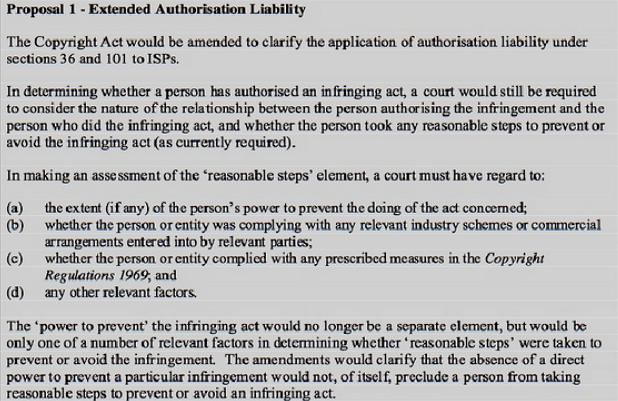TorrentFreak Email Update |
- Pirate Bay Founder’s Religious Rights Spark New Complaint
- US Wants to Criminalize Movie and Music Streaming
- Leaked Paper Reveals Aussie Anti-Piracy Crackdown Musings
| Pirate Bay Founder’s Religious Rights Spark New Complaint Posted: 26 Jul 2014 02:49 AM PDT
Sunde’s destination was Västervik Norra, the prison allocated to him following the finalizing of his jail sentence in 2012. The first few days and weeks of Sunde’s imprisonment went silently under the media radar, but by the end of June the former Pirate Bay spokesman was making his voice heard on his prison conditions. Sunde has been both vegetarian and vegan, a dietary choice that has proven difficult during his incarceration. In a letter to authorities he complained that due to his needs not being met, his weight had plummeted 11 pounds (5kgs) in just four weeks. It’s not clear whether that complaint resulted in any positive action, but just a month later Sunde is making his displeasure known once more, this time over his religious rights. Four years ago a group of self-confessed pirates began a mission to have their beliefs recognized as a religion in Sweden. The Church of Kopimism – which holds CTRL+C and CTRL+V as sacred symbols – eventually prevailed and in 2012 was officially approved by the authorities.  Just recently Sunde tried to exercise his right to meet with a representative of his chosen religion, but was met with prison red tape in response. “The board of spiritual care (NAV) doesn’t have any representative for the Kopimist faith with whom they cooperate and therefore the Prison and Probation Service should provide permission for electronic contact with representatives from the Kopimist faith to believers,” Sunde wrote in his letter to authorities. Whether this complaint will result in physical or even virtual access to a Kopimist priest is not yet clear. However, since Kopimism is an official religion, the authorities may have little choice but to comply. This throws up an interesting privacy-related question that Sunde himself mused over some two-and-a-half years ago. “In some religions…there's a Seal of Confession – which means that when you talk to a priest in the congregation, the priest has to keep what you say confidential. This is respected in some countries as law, where the courts can not make the priest testify against the individual,” Sunde said in 2012. “This is probably the thing that I love the most with Kopimism as a religion – we can have yet another form of P2P communication – Priest2Priest. With no legal right for anyone to listen in to the conversation perhaps.” It seems highly unlikely that Sunde will be allowed an online “encrypted confession” with a Kopimism “priest” anytime soon, but The Church of Kopimism’s legal status could throw up some headaches and dilemmas for the authorities as they try to process Peter’s complaint. Not that he intended that, of course. Source: TorrentFreak, for the latest info on copyright, file-sharing and anonymous VPN services. |
| US Wants to Criminalize Movie and Music Streaming Posted: 25 Jul 2014 10:56 AM PDT
After praising previous successes, such as the shutdown of Megaupload and the prosecution of several IMAGiNE members, Bitkower explained the evolving challenges copyright holders are dealing with. From illegal piano rolls in the early 1900s to floppy disks a century later, new technologies have presented new threats, he argued. With the rise of broadband access this process has worsened and the most recent challenge is combating illegal streaming services. “One new challenge confronting copyright owners and law enforcement authorities is the rise of Internet ‘streaming’ as the dominant means of disseminating many types of copyrighted content online. This activity also derives from advances in technology: in this case, the growth in availability of high-speed Internet to the average consumer,” Bitkower said. The problem for the Department of Justice and copyright holders is that these services are harder to prosecute. Technically, streaming doesn’t count as distribution but as a public performance, which can only be charged as a misdemeanor. The administration tried to remedy this in 2012, by implementing the SOPA and PIPA bills, but these were shelved after public outrage. Many people feared that uploading copyrighted YouTube videos could possibly land them in jail and took their concerns to the streets. However, fast forward a few years and the same plan is back on the table. “The Administration recommends that Congress amend the law to create a felony penalty for unauthorized Internet streaming. Specifically, we recommend the creation of legislation to establish a felony charge for infringement through unauthorized public performances conducted for commercial advantage or private financial gain,” Bitkower explained. “It would emphasize the seriousness of the threat that unauthorized streaming poses to legitimate copyright holders, clarify the scope of conduct deemed to be illegal in order to deter potential infringers, and provide the Department with an important tool to prosecute and deter illicit Internet streaming.” In addition to criminalizing illicit streaming, Bitkower also called for persistent funds to support its international operations. In recent years the DoJ has educated police forces abroad to deal with copyright infringement. This apparently includes training on very basic skills, such as how to connect to the Internet in the first place. “The program has realized numerous successes, including a Ukrainian police officer who, after receiving training, was able to use a dial-up Internet connection from his home computer to bring down the largest illegal file sharing service in his country,” Bitkower said. The international program helped to shut down Megaupload, but could also target The Pirate Bay through tools such as “diplomatic and trade-based pressure.” Worryingly, the United States has trouble getting the facts rights, as it believes that the political Pirate Party is connected to The Pirate Bay. “In addition to the Mega Conspiracy described above, we have seen The Pirate Bay start as a file sharing site for unauthorized copies of works in Sweden, expand to other countries, and even develop its own political party in Europe,” Bitkower noted. Mistakes aside, it’s clear that the Obama administration hasn’t lost its focus on copyright infringement. All recommendations are aimed at more prosecutions, more international pressure and tougher punishments for pirates. Time will tell whether they can get Congress to agree this time around. Source: TorrentFreak, for the latest info on copyright, file-sharing and anonymous VPN services. |
| Leaked Paper Reveals Aussie Anti-Piracy Crackdown Musings Posted: 25 Jul 2014 06:56 AM PDT
Much of the negotiations have Attorney-General George Brandis at their core, with the Senator regularly being accused of lacking transparency. This week Aussie news outlet Crikey obtained (subscription) a leaked copy of a discussion paper in which Brandis and Communications Minister Malcolm Turnbull seek industry feedback on new anti-piracy proposals. The discussion paper Dated July 2014, the paper begins by outlining the Government’s perception of the piracy threat, noting that all players – from content creators to ISPs and consumers – have a role to play in reducing the illegal consumption of content. It continues with details of schemes operating in the United States (Six-Strikes), UK (VCAP) and New Zealand which aim to develop consumer attitudes through education and mitigation. Inevitably, however, the paper turns to legislation, specifically what can be tweaked in order to give movie studios and record labels the tools they need to reduce infringement ISP liability The 2012 High Court ruling in the iiNet case signaled the end of movie and TV studio litigation against service providers. With their dream of holding ISPs responsible for the actions of their pirating users in tatters, copyright holders would need new tools to pursue their aims. It’s clear that Brandis now wants to provide those via a change in the law. “The Government believes that even when an ISP does not have a direct power to prevent a person from doing a particular infringing act, there still may be reasonable steps that can be taken by the ISP to discourage or reduce online copyright infringement,” the paper reads. “Extending authorization liability is essential to ensuring the existence of an effective legal framework that encourages industry cooperation and functions as originally intended, and is consistent with Australia’s international obligations.” Proposal 1 – Extending liability
“The Government is looking to industry to reach agreement on appropriate industry schemes or commercial arrangements on what would constitute ‘reasonable steps’ to be taken by ISPs,” the paper notes. Website blocking Given several signals on the topic earlier this year, it comes as no surprise that website blocking is under serious consideration. The paper outlines blocking mechanisms in Europe, particularly the UK and Ireland, which allow for court injunctions to be issued against ISPs. Proposal 2 – Website blocking
The Irish model, which has already blocked sites including The Pirate Bay and KickassTorrents, is of special interest to the Australian Government, since proving that an ISP had knowledge of infringing conduct is not required to obtain an injunction. “A similar provision in Australian law could enable rights holders to take action to block access to a website offering infringing material, without the need to establish that a particular ISP authorized an infringement,” the paper notes, adding that such provisions would only apply to websites outside Aussie jurisdiction. It’s likely that most copyright holders will be largely in favor of the Government’s proposals on the points detailed above, but whether ISPs will share their enthusiasm remains to be seen. Stakeholders are expected to return their submissions by Monday 25th August. Source: TorrentFreak, for the latest info on copyright, file-sharing and anonymous VPN services. |
| You are subscribed to email updates from TorrentFreak To stop receiving these emails, you may unsubscribe now. | Email delivery powered by Google |
| Google Inc., 20 West Kinzie, Chicago IL USA 60610 | |
 It’s been almost two months since former Pirate Bay spokesman Peter Sunde was located on a farm in Sweden and
It’s been almost two months since former Pirate Bay spokesman Peter Sunde was located on a farm in Sweden and 
 In common with all countries heavily involved with the distribution of U.S.-sourced entertainment products, Australia us under continuous pressure to do something about the online piracy phenomenon.
In common with all countries heavily involved with the distribution of U.S.-sourced entertainment products, Australia us under continuous pressure to do something about the online piracy phenomenon.
